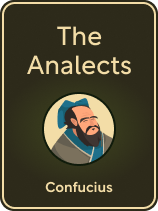

This article is an excerpt from the Shortform book guide to "The Analects" by Confucius. Shortform has the world's best summaries and analyses of books you should be reading.
Like this article? Sign up for a free trial here.
What is wuwei? Why does Confucius think everyone should have it?
Confucius, in The Analects, urges people to live decent, moral lives. One way to do this is to go with the flow of righteousness and do nothing that’s against it. This is the philosophy of wuwei, Confucianism’s doctrine of inaction.
Read more to learn what Confucius teaches about wuwei.
Confucius on Wuwei
What is wuwei? Confucianism teaches that, for good people, proper conduct seems effortless—they simply know the right thing to do and do it. For that reason, Confucius considers effortless action to be proof of good moral character. To describe this concept, he uses the term wuwei, a Chinese word that can mean action without effort or simply inaction.
(Shortform note: The Tao Te Ching provides some insight on how to practice wuwei: Let go of your personal ambitions and desires. Lao Tzu says that desire and ambition cloud your judgment, causing you to use your time and energy inefficiently. On the other hand, a selfless person isn’t distracted by ambition or desire and is therefore able to act in harmony with the people and things around them. For example, a selfish person might hesitate to help someone in trouble if he’s running late for an appointment or is worried about putting himself in danger. A selfless person would simply recognize that someone’s in danger and take action without wasting time and effort thinking about it.)
Effortless action seems to go against Confucius’s principle of hard work, but that’s because the work of wuwei is internal and therefore invisible to others. In other words, instead of struggling to do the right thing (external, visible effort), you struggle to turn yourself into the kind of person who always does the right thing (internal, invisible effort).
One of the main benefits of effortless action is that it keeps you focused on things you can control: namely, the internal, invisible effort of shaping your actions and qualifications. For example, you can’t control what people think of you, but you can work on becoming the type of person that people tend to think well of—polite, respectful, generous, and so on.
(Shortform note: Focusing on things that you can control may be a way to avoid frustration and build a sense of satisfaction with your life. In A Guide to the Good Life, philosophy professor William Irvine says that focusing your attention on what other people do is giving those people control over your happiness. For example, if you think the only way you can be happy is to get accepted into your dream school, you’re putting your happiness in the hands of that school’s admissions department. Instead, try following Confucius’s advice: Focus on becoming the type of person that school would accept (get good grades, do extracurricular activities, and so on), rather than fretting about whether they’re actually going to accept you.)
| Take Small Steps Toward Big Changes The Analects contains a lot of different lessons and advice about how to become a person who does the right thing—enough that integrating it all into your life at once may seem overwhelming. In Atomic Habits, James Clear offers some helpful advice: You don’t have to make dramatic changes to your life all at once. Instead, make small tweaks, and you’ll be surprised at how those little changes build on one another to create huge improvements. For example, instead of promising to never lie again, maybe choose one uncomfortable truth to share. That will get you a little more comfortable with telling the truth, and you’ll find that it’s easier the next time. Continuing this process, you’ll eventually find that telling the truth comes naturally to you—effortlessly, as Confucius would say. |

———End of Preview———
Like what you just read? Read the rest of the world's best book summary and analysis of Confucius's "The Analects" at Shortform.
Here's what you'll find in our full The Analects summary:
- A collection of Confucius's teachings compiled by his students
- Lessons about how to be a good learner, person, and leader
- Concrete methods for putting Confucius’s teachings into practice






